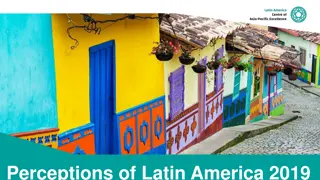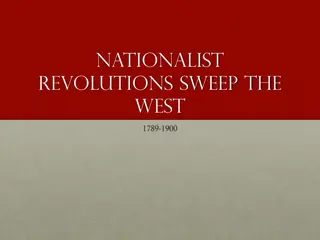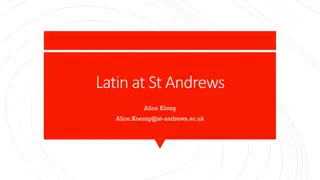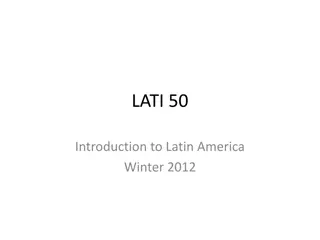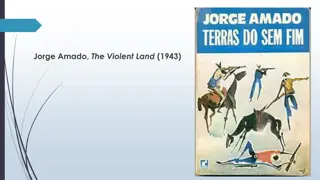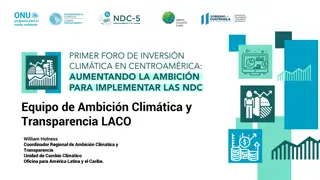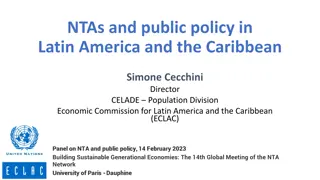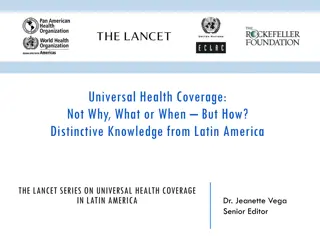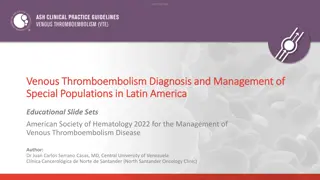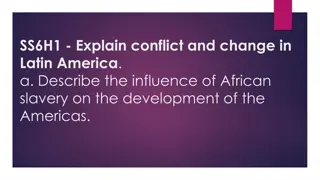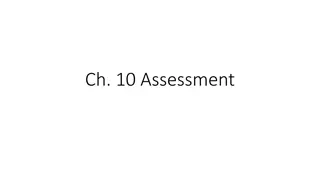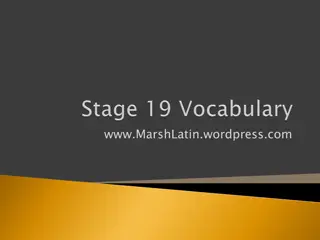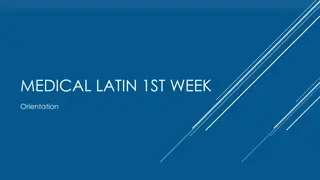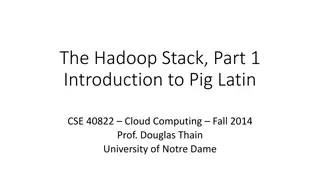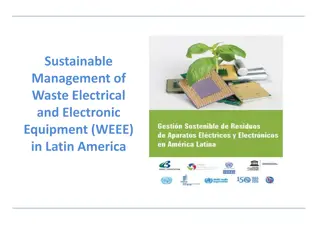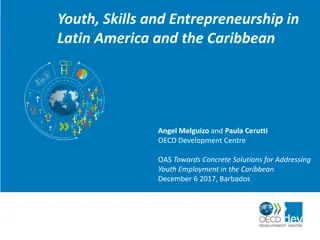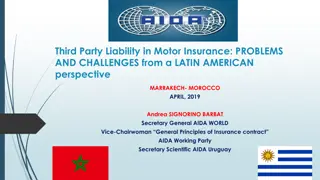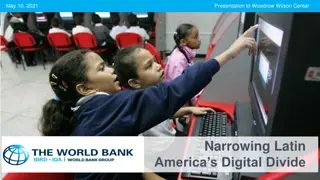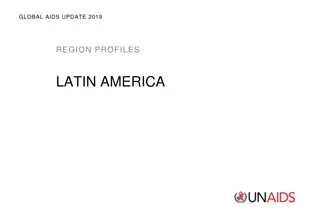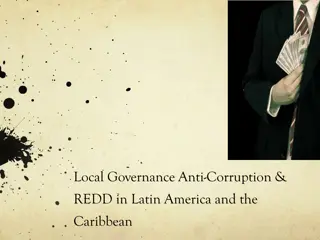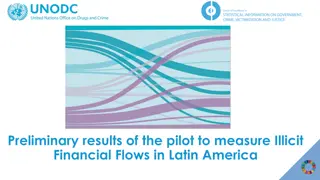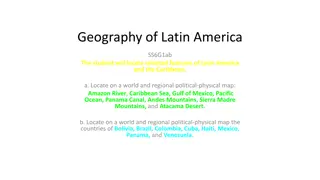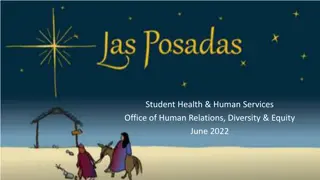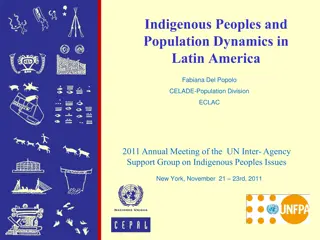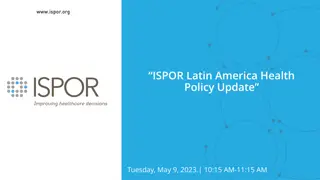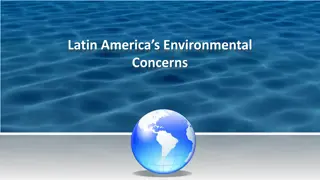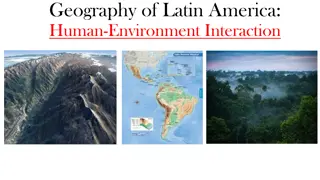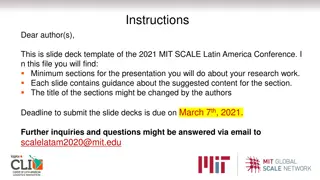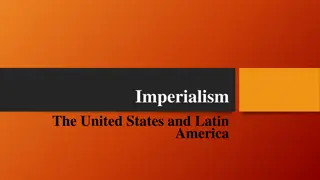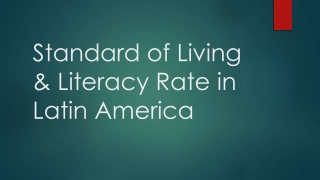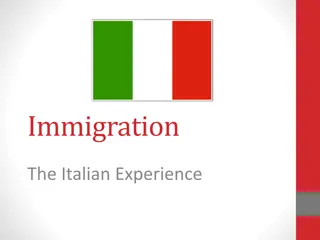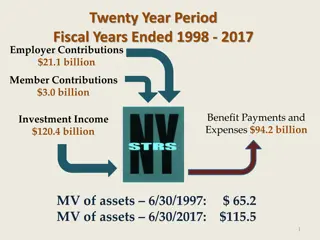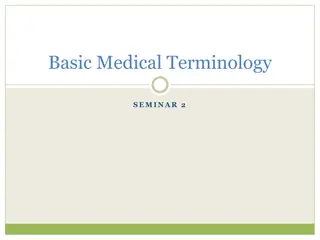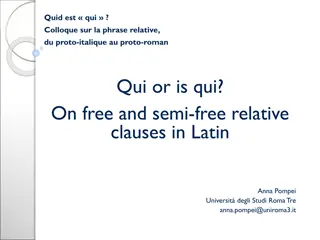Advancing Open Science Initiatives in Latin America: CLACSO's Contributions and Challenges
Latin America is at the forefront of championing open access and open science initiatives, with CLACSO leading the way. By prioritizing community-owned infrastructures and advocating for international cooperation, CLACSO aims to tackle underfunding issues and promote equitable recognition for research contributions beyond traditional publication venues. Through initiatives like the Latin American Forum on Research Assessment, CLACSO is fostering a culture that values quality and relevance in scholarly work. Join the conversation at upcoming events like the Global Summit on Diamond Open Access to contribute to shaping the future of research practices.
Download Presentation

Please find below an Image/Link to download the presentation.
The content on the website is provided AS IS for your information and personal use only. It may not be sold, licensed, or shared on other websites without obtaining consent from the author. Download presentation by click this link. If you encounter any issues during the download, it is possible that the publisher has removed the file from their server.
E N D
Presentation Transcript
. Contributions of social sciences helping achieve the United Nations Sustainable Development Goals (SDGs) The case of the Latin American Social Science Council (CLACSO) open science initiatives and Platforms for Social Dialogue Science Europe Session Advancing Digital Commons for Research Data Sharing United Nations Science Summit at UNGA78 20th. September 2023 https://sciencesummitunga.com/ssunga78/
This presentation Latin America from open access to open science research data spaces The case of CLACSO s contributions to open science Challenges to consider when preparing input for the United Nations Summit of the Future, UNGA79 - September 2024
- Latin America: schorlar-led, publicly funded, non-profit, open science infrastructures - community owned and governed open access: bibliodiversity + multilingualism - region with highest % of open access adoption in scholarly journals published in the region, with no APCs and no outsourcing to commercial publishers - university leadership of open access * open access journal platforms (university and national -OJS + regional Latindex, Redalyc-AmeliCA, SciELO) * institutional repositories (La Referencia-COAR) - national and institutional open access policies prioritize open access repositories for publications and data - more recently, open science is promoted in the region * open science policies * research data platforms (institutional, national) * co-production of knowledge with other societal actors community governance contributes to equity, inclusion, bibliodiversity and multilingualism
Sharing three of our main concerns from a developing region perspective - CLACSO s recent contributions Underfunding of community-owned infrastructures because scarce funds directed to commercial services Prioritize funding and resources dedicated to community-based infrastructures/initiatives with no paywalls Eg. CLACSO s participation in BOAI20 and ISC principles for scientific publishing Weak international dialogue, cooperation and interoperability among community-owned infrastructures Call for more international collective action, have a stronger and collective voice eg. CLACSO s participation in consultations on UNESCO Open Science Recommendations, eg. Events: Global Summit on Diamond Open Access (Toluca, Mexico, 23-27 October 2023) Researchers are rewarded only when publishing in mainstream journals with prestige industry indicators, making invisible other contributions Reward quality and relevance independent of publication venue Reward doing peer-review of contents from community-based infrastructures (eg.: repositories) Eg. CLACSO s Latin American Forum on Research Assessment (FOLEC) activities and Declaration
Research data In LAC, national policies prioritize repositories for open access to research outputs In institutional, national and subject repositories, eg.: National systems of institutional repositories in 11 countries of LAC, with incipient collections of datasets, as reflected in La Referencia Data repositories, eg.: State data repository: Eg. Rede de Reposit rios de Dados Cient ficos do Estado de S o Paulo, Brazil), Dataverse used in 18 data repositories in Latin America Subject data repositories, integrated to international subject repositories, eg.: SiBBr-GBIF: The Brazilian Biodiversity Information System, member of the Global Biodiversity Information Facility Colombian Information System on Biodiversity (SID) /GBIF
Eg. of concerns in relation to research data management Costs of research data management, promotion and training for FAIR and CARE implementations, promote exchange of experiences, development of new functionalities needed in repositories for data, preprints, multimedia, peer- review, cost of identifiers, and other services. Extractivism of data the commodification of interactions and contents hidden work in participation in international open science programs. Who provides data for collaborative research and participates in the project's design and decisions? Issues of diversity and inclusiveness in contents, management of research data, and decisions about technologies and methodologies to be used to reduce inequities.
CLACSOs path towards open science Grant calls require a description of how and where research outputs will be available in open access CLACSO s network of research institutions publish > 400 journals in OA (no APC) and more than 3.000 books in open access (no BPC) CLACSO s repository: articles, journals, books, book chapters, research reports, opinions papers, multimedia Alliances: with Redalyc-AmeliCA: a joint collection of 1.025 SSH quality journals in open access. Global Summit on Diamond Open Access (Mexico, 23-27 October 2023) CLACSO s Declaration on open access managed as a commons by the scholarly community (2015). Campaign promoting non-commercial open access in Latin America, together with other OA initiatives in the region, and in the world. Latin American Forum on Research Assessment (FOLEC-CLACSO): reorienting research assessment mechanisms to foster open science. Undertakes research, advocacy, and consensus on changes needed.
CLACSOs Regional Working Groups (87 WG at present, 5.000 members) Objective: the creation of interdisciplinary networks of researchers, articulated with public policy decision-makers and referents of social organizations, research on relevant social issues and problems for Latin America and the Caribbean It is recommended that 70% of members of WG are researchers and 30% other participants (social movements, policymakers, activists, and other social actors). Equal gender representation. Stimulate participation of young researchers. WG: minimum of 15 members from at least 6 countries (ensure participation of members from countries with less developed research capacities). All collaborative activities from the WG should be open to the public and outputs in open access WG participate in CLACSO s Platforms for Social Dialogue Towards knowledge creation processes to make it more inclusive and collectively governed by stakeholders
Social Sciences in the face of inequality in Latin American and the Caribbean: PLATFORMS FOR SOCIAL DIALOGUE
PLATFORMS FOR SOCIAL DIALOGUE CLACSO's Platforms for Social Dialogue (PSD) are devices that articulate and promote multi-stakeholder exchanges between the academic organisations and public policies makers in order to co- produce knowledge, build capacities that recognise the power of social activism and influence both public policies and the transformation of the realities of the most vulnerable communities and territories. community, civil society Each PSD has components linked to the areas of Research, Training, Communication and Publications, Training, Communication and Publications, each proposal may have thematic, regional or regional thematic emphasis, regional or geographic focus, unique articulations and formats.
PLATFORMS FOR SOCIAL DIALOGUE - components - Management and production of scientific knowledge through research networks. - Generation of specific and strategic knowledge through lines of support for individual and team research projects. - Training of target populations to influence the training of social leaders and the development of public policies. - Communication through dissemination campaigns specially designed to influence public opinion. - Publication of results generated by the Platforms of Social Dialogue through written formats in open access.
CLACSOs PLATFORMS FOR SOCIAL DIALOGUE 1. Inequalities and poverty in Latin America and the Caribbean. 2. Rights, violence and gender equality. 3. Migrations and human mobility. 4. Reconfigurations of work in today's world: subjects, organizations and processes. 5. Democracy, Human Rights and peace. 6. Social movements and activism in Latin America and the Caribbean. 7. Right to Education. 8. Environment, climate change and social development.
PLATFORM: DEMOCRACY, HUMAN RIGHTS AND PEACE International Forum "Social Dialogue for Equality and Human Rights" This international forum was co-organised by CLACSO and the Vice-Ministry for Social Dialogue, Equality and Human Rights of Colombia, headed by Lilia Solano Ram rez. More than 1,300 people attended the forum, with international guests from Latin America, Europe, North America, social leaders from all over the region and public policy makers.
CLACSOs Platform for Social Dialogue gender inequalities indigenous women We have orality as a practice and many times we do not have the documentation of our words Their worldview, or in their languages, there is no word to refer to equality inequality is more present, it is part of our reality This research and publications are a way in which we make our voice present, research to document our knowledge We document our knowledge for the present and future generations of indigenous women CONAMI-Coordinadora Nacional de Mujeres Ind genas, M xico https://www.clacso.org/nudos-criticos-sobre-la-desigualdad-de-genero/ https://www.clacso.org/wp-content/uploads/2021/03/V3-Conv01-Castaneda-Salgado-Construyendo-relaciones- Mexico.pdf https://www.clacso.org/construyendo-relaciones-de-igualdad-desde-la-practica-comunitaria-indigena-3/
Research data is shared in context https://www.gida-global.org/care
Input for the United Nations Summit of the Future UNGA79 (September 2024) on knowledge sharing helping achieve UN SDG Fund and promote Open infrastructures that facilitate access, sharing, and production of knowledge to advance the UN SDGs. Prioritize community control over knowledge sharing on SDG, rather than relying on commercial enclosures. Ensure community participation in the design of infrastructures and services for knowledge sharing Strengthen the global culture and infrastructures for sharing knowledge in collaborative and cooperative models. re-embrace the principles of the United Nations collaborative and cooperative international information systems, particularly in domains of the SDG
SDGs need as much local as international research outputs and contributions from other knowledge systems .
Thank you !!! www.clacso.org folec@clacso.edu.ar @_CLACSO



